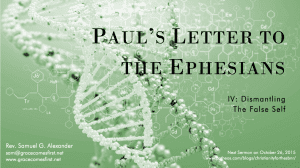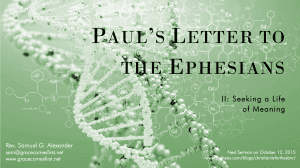The creative power of God is operating in the evolution of all things – Cultural Evolution, Biological Evolution, Spiritual Evolution, Moral Evolution, Economic Evolution, just to name a few. Spirit responds to stress or pain in a system and creates what is new out of the death of the old, transcending and including what went before. This is the same thing as the power of the cross and resurrection. This is the creative love of God. The world is in enormous pain and this requires a conscious response of enormous love. We are awake and aware that we participate in our own evolution and are called to expand the way we act in creative love for the world.
Evolution and Faith V – Ethical Imperative
Matthew 5:1-12; 15:29-31
Introductory Reading: We find ourselves ethically destitute just when, for the first time, we are faced with ultimacy, the irreversible closing down of the Earth’s functioning in its major life systems. Our ethical traditions know how to deal with suicide, homicide, and even genocide; but these traditions collapse entirely when confronted with biocide, the extinction of the vulnerable life systems of the Earth, geoside, the devastation of the earth itself. . . . The human is at a cultural impasse. . . . Radical new cultural forms are needed.
Our text of scripture comes from two places in the Gospel according to St. Matthew today. First in the fifteenth chapter, beginning in the twenty-ninth verse and then the familiar passage of the beatitudes in the fifth chapter in the very beginning, what we call the Sermon on the Mount. Would you listen as the spirit of God brings a live Word to you.
15:29-31 After Jesus had left that place, [that place being the encounter with the Canaanite woman where he offered blessing and healing to her outside the place of Israel]. After he left that place, Jesus passed along the Sea of Galilee and he went onto a mountain where he sat down. Great crowds came to him and they brought they lame, maimed, lined, mute, many others. They put them at Jesus’ feet and he cured them so that they crowds were amazed when they saw the mute speaking and the maimed whole and the lame walking, the blind seeing and they praised the God of Israel.
5:1-12 When Jesus saw the crowds, he went up upon the mountain and after he sat down, his disciples came to him. Then he began to speak and he taught them, saying blessed are the poor in spirit, for theirs is the kingdom of heaven, blessed are those who mourn for they will be comforted, blessed are the meek for they will inherit the earth, blessed are those who hunger and thirst for righteousness for they will be filled. Blessed are the merciful for they will receive mercy, blessed are the pure in heart for they will see God, blessed are the peacemakers for they will be called children of God, blessed are those who are persecuted for righteousness sake, for theirs is the kingdom of heaven, blessed are you when people revile you and persecute you and utter all kinds of evil against you falsely on my account. Rejoice, be glad, for your reward is great in the heavens for in the same way they persecuted the prophets who went before you.
The grass withers and the flower fades, but the word of our God lives forever.
We have been talking about evolutionary theory and its interface with Christian faith. When you say the word “evolution,” I suspect most people in our culture start to think, “Yeah I know what that means, we’re descended from apes.” If they’re slightly more educated, maybe what they think is that we have a common ancestor with the apes, and maybe some people, especially if they’re well traveled, know something about the birds on the Galapagos Islands and evolution. Others who read and study it recognize that the theory is about the evolution of all life. It’s just how it works.
You see, evolution moves in steps. Life grows and develops in steps. It responds to stress and it responds to pain. The response transcends the current system. “Lower,” or let’s call them “less-evolved” so as not to be judgmental, forms of life are transcended, become more complex. The complexity is surprising, can’t really be predicted – like the property of flow that came from the union of 2 Hydrogen and 1 Oxygen atom. So, single-celled organisms left to their own devices don’t survive as well as a group of single-cells in cooperatives. Slime mold as we’ve been saying over these last weeks, is an example of how a single-celled organism has transcended itself by entering into a cooperative arrangement, but it is also included. Similar to a book made of paragraphs, which are made of words, which are made of letters.
And as that cooperation continues, as evolution proceeds, what we find is that some of those single cells, (or at least their progeny) take on a specialized role, maybe they even get together in groups and perform specialized functions, like eyes for eyesight. Think about it, it’s really quite remarkable; responding to stress and pain, to some problem confronting creation, something new emerges from what Disney called the “circle of life,” the movement from death into new life and that very process, from the death to what’s new, not to just a repeat of what’s old, is the very same thing as the movement from cross to resurrection. When Jesus died on the cross, he was risen, not as the same old human being, but as a new humanity, more evolved.
I’ll say more about that on Easter, but I don’t take that to be just a metaphor. I take that to be something very real. I believe that human beings can grow and evolve and do in fact make steps forward. We continue to evolve, internally, culturally, economically, physically and Jesus was a part of that process.
So, why does any of this matter? It matters because the world is in outrageous pain. We all know it. The world is in outrageous pain and longs for creation’s evolutionary response. Spirit is calling to us to be part of that response. That’s what Jesus was about. He was all about that in our first passage in Matthew as he healed the lame, maimed blind and the mute; everybody came to him. But Jesus was about more than healing the body because evolution is about more than growth in the body, it is evolving all of life.
Consider where homo sapiens came from. Species we evolved from had just a reptilian brain, the brain that responds to fear, that raw sense of protecting life and grabbing hold of what will sustain life. But we are also ancestors of creatures that developed a mammalian brain, able to process emotion. But we developed further, we eventually develop that neo-cortex, that frontal lobe that makes us able to have a sense of self-consciousness.
So, physical evolutions, yes, but it’s more than the physical brain that is evolving. For this moves us into the evolution of consciousness. Jean Gebser, a German researcher, mapped out the way consciousness evolved from archaic to magic, to mythic, to mental and into an integral frame. Researchers have been tracking the way human consciousness has in fact evolved. Fowler, a researcher at Harvard, looked at the way our faiths, our beliefs, evolved from magic into mythic, into a mental state, into a more coherent integral state. Researchers are mapping the evolution of our cultural values. Clare Graves, Beck and Cowan have plotted the way culture evolves. They’ve mapped how tribal consciousness and values evolve into a mythical consciousness that supports nations, and how that evolves into modern values that provide the engine for industrial growth. We are able to recognize that human beings evolve. Our culture evolves, our internal lives evolve, our brains have evolved, even the structures that hold us together evolve. Once upon a time all we did was go out, hunt and gather, poke around, until finally we figured out that if we plowed and stayed put we would be able to grow crops more efficiently. That set the stage for invention through which industries came and now the information age.
My point here is this: human beings evolve and when we evolve, we evolve internally and externally and we do that both as individuals and as a groups of people, and each of these four areas of development effect the others. They evolve together. In fact we get in trouble when evolution gets out of balance – consider a tribal warrior with modern, (read nuclear), weapons.
What we know is that Spirit, (however you might wish to define it), drives us forward. Christians describe that work of Spirit as we see it through the lens of the Christ. The Christ nudges us forward towards that moment of complexity, of unity, of shalom. Christ inspires us to become whole step by step each step responding to the pain, the dysfunction of the level of development before it.
The world is in outrageous pain. And what shall be our response? If the Spirit of God who we come to know in Scripture is indeed unfolding within us, what shall be our response to this outrageous pain other? It can be none other than outrageous love. But let’s be clear, this is not a “wrap it up and hold it close” kind of love. No, this is a productive, creative kind of love, the kind of love that seeks to put value into the creation. The creative Spirit of God is unfolding within us right now; that love is unfolding within us right now; the world is in outrageous pain and needs our response of love to evolve.
A new step is right on the horizon, because evolution responds to enormous pain and those conditions have been met. But at this critical moment in development, consider what’s happened to our internal understanding of the presence of Spirit. If it is true that we develop spiritually and religiously, what has happened since the advent of modernism? Modernism has done a good job at developing technologies, which allow us to become more and more productive, but it has deconstructed any notion about an active presence of God in our lives. Our “technological line of development” has grown enormously while our “spiritual line of development” has atrophied. That is a problem because it is the spiritual and religious line of development that gives life its purpose, that give us the ground of being on which we walk. Without the active presence of God in our lives, without any sense of purpose, we’ve placed our technological inventiveness at the service of our lusts and desires. In so doing we have brought the world to the brink of ecological destruction.
That’s what happens when that spiritual line of development atrophies. But even more worrisome is the post-modern deconstruction of truth. “All truth is perspectival,” the post-modernist sentiment says. And with that statement, without the moral foundation it provides, we have lost the ability to hold anyone accountable for their behavior. Of course those in power can hold others accountable, but the truly disturbing thing is this: if there is no truth, if there are only competing perspectives about what is true, if that’s all that’s possible, then whose “perspective on truth” wins? Answer: the one with the biggest gun. That is a recipe for disaster. “The one-two punch of modernism and post-modernism,” Ken Wilber calls it. It creates outrageous pain, pain that demands an immediate response of outrageous love.
The marks are right there. Jesus called his disciples to respond to the outrageous pain of his time. He didn’t know the mechanism of evolution, but he understood how to participate in Spirit’s creative activity. From the moment the Spirit descended upon him at his baptism, the Spirit was moving his future forward. From the time Spirit drove him into the wilderness to be tested and formed, to the moment he gave his life to establish shalom, Spirit was unfolding in his life. Yes, he healed people on the mountainside that day, but he went further and imagined what an evolved world would look like. He could see a human community unified in the presence of God.
Scholars argue about whether or not the beatitudes are intended to set forth a realistic vision of human community. Was Jesus just pointing the way, or was he idealistic enough to want that community to exist. I’m clear on that one; he meant it. Blessed are those who mourn, blessed are the meek, blessed are the merciful, blessed are the pure in heart, blessed are the peacemakers. He was imagining a world unified in the presence of God, a world loved, that is driven by the power of the Spirit of God, a world unfolding within us. It is real; it outlines what’s next. It calls us to live and to love one step larger than we live right now.
So imagine living in that world, in a world where you attend to your own life, to the evolution of your own Spirit, attend to the evolution of the culture around you. Can we finally engage in the marketplace of ideas as though it matters what we think, what is true and what is false? Can we take care of our bodies in a way that makes us more effective? Can we go to work on the structures of this world such that they support unity? Spirit is calling. We don’t know what the next will be; it will surely surprise us. But it is clear that what will be will emerge because the love of God is on the move. The winds of Spirit are blowing. The days of a deconstructed faith are done. It’s time for you and for me to reconstruct our faith because it matters. People are waiting.
People wonder aloud to me about the success of evangelical churches. How can seriously educated people – doctors, lawyers, professors – how can they remain in a faith community that talks about God as though He exists as a being who can and does alter the laws of nature at will to accomplish His will. How can they do that?
You know that I don’t look at the world that way. But I get it. I get why people – educated people in tremendous numbers stay in such communities and seek to believe those myths. They look at the modernist and the postmodernist deconstruction of faith and they see the vast spiritual wasteland left in its wake and they say, “That’s not for me. I’m staying right here.” Can we blame them?
What is needed is a reconstruction of our faith and that is happening. Spirit is moving. When we see so many identifying themselves as “spiritual but not religious” we know Spirit is on the move. When I hear of evangelical pastors spending time in meditation at Spirit Rock I know Spirit is on the move. Do you feel it coming? Could it be that we are reaching that tipping point, that moment when some new thing emerges out of the outrageous pain in our world? Can you love one step larger?
That’s what Jesus is about in the Gospel of Matthew, from chapter one, right to the end when he tells all disciples, everyone awake to God’s power to create what is new and beautiful, tells all of them to go out and make disciples of all nations. The Spirit of God is calling you, the outrageous pain of the world is demanding that you love one step larger – now.
Think you can’t do anything? Think you can’t have much impact? Paul Tillich, a theologian of the last century, was fond of pointing out that when we talk about the great era of the Renaissance, that moment in human history when ideas grew up and carried humanity out of the darkest of ages, when we talk about that era in human history we do well to remember that only about one thousand people were involved. One thousand people educated enough and wealthy enough to participate in the Renaissance. One thousand human minds.
Think you can’t do anything? With the Spirit of God unfolding creation within and around you, you have power to change this world. The outrageous pain requires outrageous love. Will you love one step larger?
Evolution and Faith V–Ethical Imperative (Audio – right click to download)











